|
黄钰生(字子坚)
黄钰生先生,字子坚,1898年生人,原籍湖北,相继毕业于南开中学、清华大学、美国劳伦斯学院、芝加哥大学,获教育心理学硕士学位。1925年起开始担任南开大学教授,兼任秘书长。抗战胜利后任天津教育局局长;解放后任津沽大学师范学院院长、天津图书馆馆长、天津市政协副主席。1960-1965年在任天津市图书馆馆长期间兼任南开大学外文系教授, 教口语。晚年的黄钰生一直为建设天津图书馆而奔波,1990年以92高龄辞世。
  
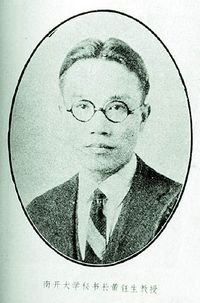
南开大学秘书长(1925-37)黄钰生教授
 纪念黄钰生先生逝世30周年-追寻父亲的足迹 纪念黄钰生先生逝世30周年-追寻父亲的足迹
|
English Playwright, Poet William Shakespeare (1564-1616) |

(This work of art is in the public domain.)
|
William Shakespeare (26 April 1564 – 23 April 1616)was an English poet and playwright, widely regarded as the greatest writer in the English language and the world's preeminent dramatist. He is often called England's national poet and the "Bard of Avon" (or simply "The Bard"). His surviving works consist of 38 plays, 154 sonnets, two long narrative poems, and several other poems. His plays have been translated into every major living language and are performed more often than those of any other playwright. Shakespeare was born and raised in Stratford-upon-Avon. At the age of 18, he married Anne Hathaway, who bore him three children: Susanna, and twins Hamnet and Judith. Between 1585 and 1592, he began a successful career in London as an actor, writer, and part owner of a playing company called the Lord Chamberlain's Men, later known as the King's Men. He appears to have retired to Stratford around 1613, where he died three years later. Few records of Shakespeare's private life survive, and there has been considerable speculation about such matters as his physical appearance, sexuality, religious beliefs, and whether the works attributed to him were written by others. Shakespeare produced most of his known work between 1590 and 1613. His early plays were mainly comedies and histories, genres he raised to the peak of sophistication and artistry by the end of the sixteenth century. He then wrote mainly tragedies until about 1608, including Hamlet, King Lear, and Macbeth, considered some of the finest works in the English language. In his last phase, he wrote tragicomedies, also known as romances, and collaborated with other playwrights. Many of his plays were published in editions of varying quality and accuracy during his lifetime. In 1623, two of his former theatrical colleagues published the First Folio, a collected edition of his dramatic works that included all but two of the plays now recognised as Shakespeare's. Shakespeare was a respected poet and playwright in his own day, but his reputation did not rise to its present heights until the nineteenth century. The Romantics, in particular, acclaimed Shakespeare's genius, and the Victorians hero-worshipped Shakespeare with a reverence that George Bernard Shaw called "bardolatry". In the twentieth century, his work was repeatedly adopted and rediscovered by new movements in scholarship and performance. His plays remain highly popular today and are constantly studied, performed and reinterpreted in diverse cultural and political contexts throughout the world.
|
Sonnet 18
by William Shakespeare
Shall I compare thee to a summer's day?
Thou art more lovely and more temperate:
Rough winds do shake the darling buds of May,
And summer's lease hath all too short a date:
Sometime too hot the eye of heaven shines,
And often is his gold complexion dimmed,
And every fair from fair sometime declines,
By chance, or nature's changing course untrimmed:
But thy eternal summer shall not fade,
Nor lose possession of that fair thou ow'st,
Nor shall death brag thou wand'rest in his shade,
When in eternal lines to time thou grow'st,
So long as men can breathe or eyes can see,
So long lives this, and this gives life to thee.
|
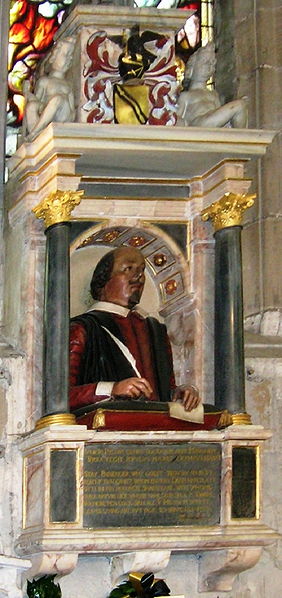
Shakespeare's funerary monument (part), Holy Trinity Church, Stratford Upon Avon, England.
(This work of art is in the public domain.)
Sonnet 116
by William Shakespeare
Let me not to the marriage of true minds
Admit impediments, love is not love
Which alters when it alteration finds,
Or bends with the remover to remove.
O no, it is an ever-fixed mark
That looks on tempests and is never shaken;
It is the star to every wand'ring bark,
Whose worth's unknown, although his height be taken.
Love's not Time's fool, though rosy lips and cheeks
Within his bending sickle's compass come,
Love alters not with his brief hours and weeks,
But bears it out even to the edge of doom:
If this be error and upon me proved,
I never writ, nor no man ever loved. |
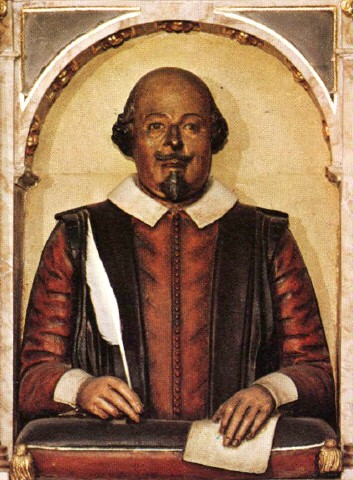
Shakespeare's funerary monument (part), Holy Trinity Church, Stratford Upon Avon, England.
(This work of art is in the public domain.)
Macbeth:
by William Shakespeare
Accursed be that tongue that tells me so;
For it has cow'd my better part of man!
And be these juggling fiends no more believed
That palter with us in a double sense;
That keep the word of promise to our ear;
And break it to our hope! -- I'll not fight with thee.
--from Macbeth, Act V, Scene VIII, L21-26 ,
|
|
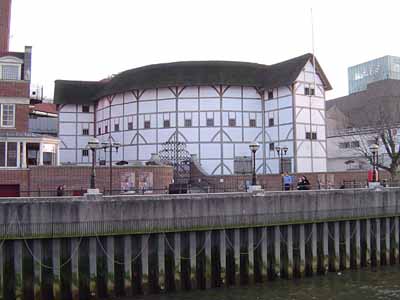
Shakespeare Global Theatre (reconstructed), London。
(
Licensed under the GNU Free Documentation License.)
Dirge from Cymbeline
by William Shakespeare
Fear no more the heat o' the sun,
Nor the furious winter's rages;
Thou thy worldly task hast done,
Home art gone and ta'en thy wages;
Golden lads and girls all must,
As chimney sweepers, come to dust.
Fear no more the frown o' th' great;
Thou art past the tyrant's stroke:
Care no more to clothe and eat;
To thee the reed is as the oak:
The sceptre, learning, physic, must
all follow this, and come to dust.
Fear no more the lightning flash,
The all dreaded thunder stone;
Fear no slander, censure rash;
Thou has finished joy and moan.
All lovers young, all lovers must
consign to thee, and come to dust.
No exorcisor harm thee,
Nor no witchcraft charm thee!
Ghost unlaid forbear thee,
Nothing ill come near thee.
Quiet consummation have,
And renowned be thy grave!
|
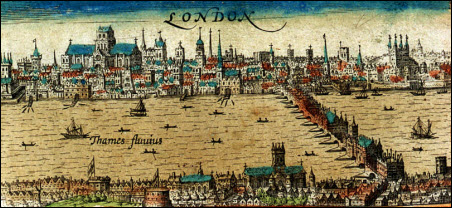
Shakespeare's London (This work of art is in public domain.)
Rape of Lucrece (except)
by William Shakespear
FROM the besieged Ardea all in post
Borne by the trustless wings of false desire,
Lust-breathed Tarquin leaves the Roman host,
And to Collatium bears the lightless fire
Which, in pale embers hid, lurks to aspire
And girdle with embracing flames the waist
Of Collatine's fair love, Lucrece the chaste.
Haply that name of chaste unhapp'ly set
This bateless edge on his keen appetite;
When Collatine unwisely did not let
To praise the clear unmatched red and white
Which triumphed in that sky of his delight,
Where mortal stars, as bright as heaven's beauties,
With pure aspects did him peculiar duties.
For he the night before, in Tarquin's tent,
Unlocked the treasure of his happy state;
What priceless wealth the heavens had him lent
In the possession of his beauteous mate;
Reck'ning his fortune at such high-proud rate
That kings might be espoused to more fame,
But king nor peer to such a peerless dame. |
| |
|
|
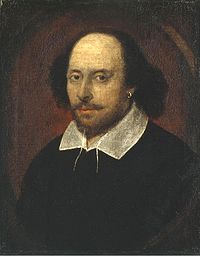
(This work of art is in public domain.) 
(This work of art is in public domain.)
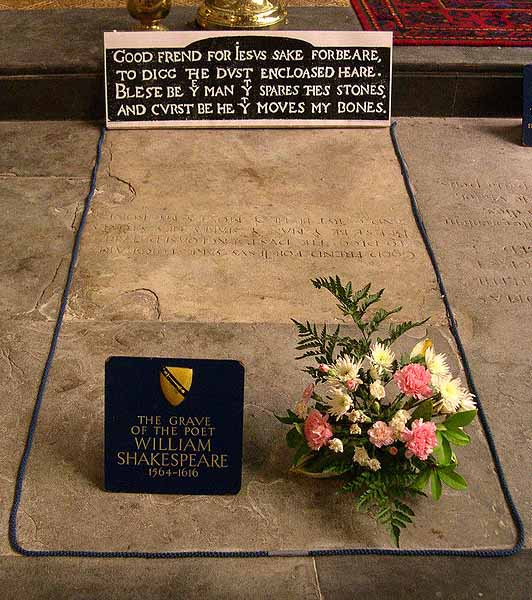
Sheakespeare's Grave, picture by David Jones, licenced under these terms.
 
|
   
|




